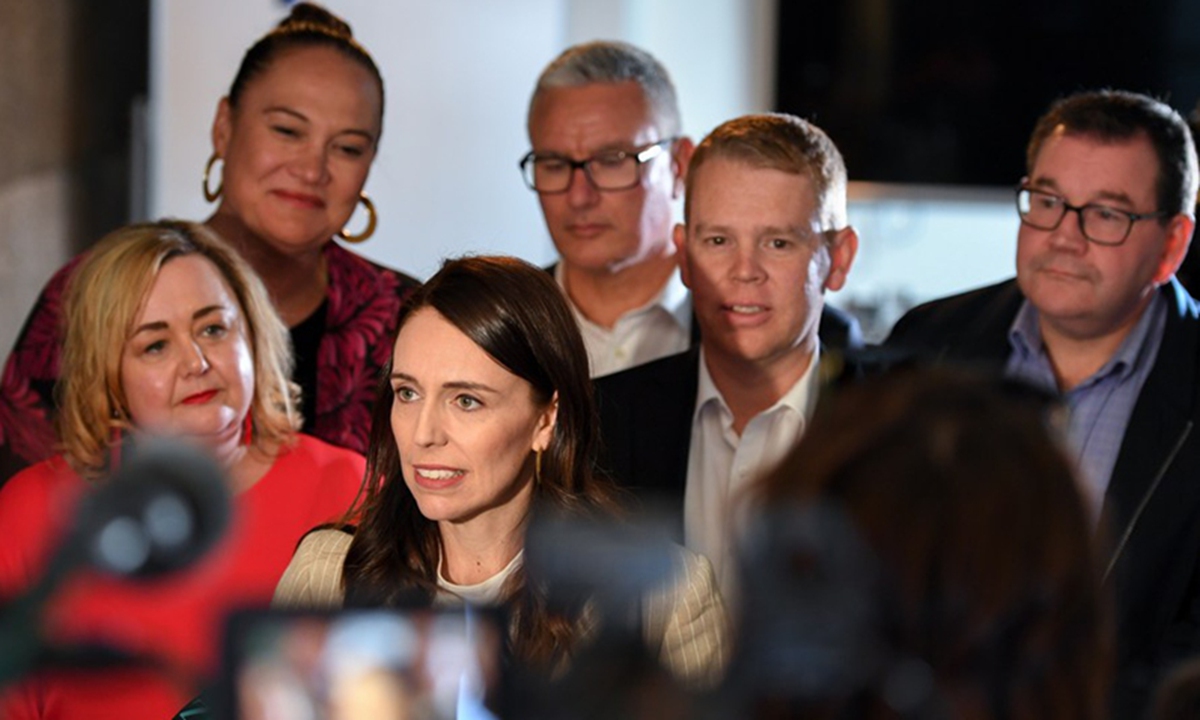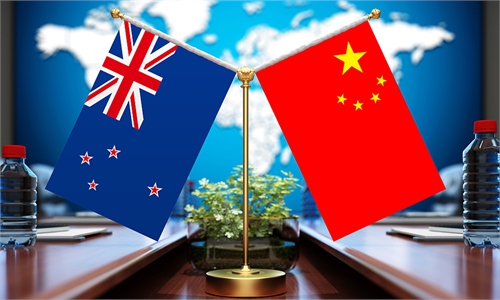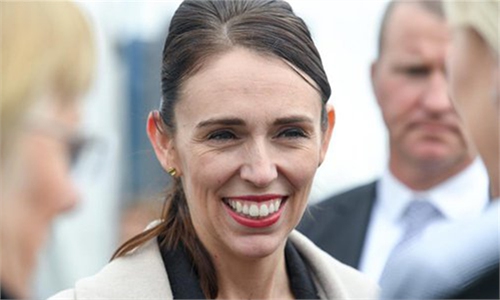
New Zealand Prime Minister Jacinda Ardern (front) File Photo: Xinhua
After Australia, the US and the UK announced their trilateral security pact AUKUS in September, the international community has paid much attention on how New Zealand has responded, and would respond, to the deal. New Zealand is a close ally of Australia and member of the intelligence-sharing alliance Five Eyes. Yet it was snubbed by the AUKUS nuclear powered submarine pact. Many have interpreted the exclusion as that New Zealand is of less influence in the Five Eyes alliance.
Responding to outside speculations, New Zealand Prime Minister Jacinda Ardern said that Wellington would never be involved in the development of nuclear-powered submarines. She also rejected the possibility that any submarines would be allowed to enter New Zealand's waters under any circumstances. Following this in late October, Annette King, New Zealand's top diplomat to Australia, said Wellington is open to collaborating on quantum computing, artificial intelligence and other emerging technologies - one of the areas covered by the pact. According to Japanese media outlet Nikkei on Wednesday, New Zealand's Ministry of Foreign Affairs and Trade said the country "has not been invited to join AUKUS," but Wellington "will continue to engage closely with the US, the UK and Australia on how we can cooperate to mutual benefit in such areas."
Many Western media reports have interpreted those remarks as a signal that New Zealand is "opening the door" to AUKUS. But it's too early to say so. The key to the problem is that the outside world now doesn't know what kind of mechanism AUKUS is going to evolve into.
It seems that Washington still doesn't have a clear idea about whether AUKUS will expand into other areas either. At least until now, the center piece of the AKUSU arrangement is the building of nuclear-powered submarines to be based out of Australia. It's unclear whether and how institutionalized cooperation in other areas will be carried out. Therefore, if AUKUS was all about helping Australia build nuclear-powered submarines, how can New Zealand, which has long insisted on an anti-nuclear policy, join it?
King's statement also shows that some people in New Zealand are feeling a little uneasy about being excluded from higher-level intelligence and security cooperation in the future. New Zealand's security and military departments also hope to cooperate more with the US, Australia and other countries. But on the whole, the New Zealand government's attitude toward AUKUS is cautious. Why? Because the establishment of AUKUS has caused huge controversy on the global stage. The international community is generally worried that AUKUS will trigger a regional arms race and stimulate other countries to equip nuclear submarines. Australia's move of equipping nuclear submarines is also seen as having a serious impact on the international nuclear non-proliferation mechanism. It runs counter to the efforts of South Pacific island countries and Southeast Asian countries to build a nuclear-weapon-free zone.
In addition, AUKUS has also aggravated doubts in regional countries about Australia's military intentions and strategic role. Nuclear submarines are strategic weapons. Australia's deployment of nuclear submarines under the pretext of the so-called China threat has not only deteriorated China-Australia relations, but also made regional countries more suspicious of Australia's military ambitions.
AUKUS has already brought about a lot of troubles. If New Zealand is wise enough, it should not easily change its position and get itself into this muddy water. From the perspective of the strategic intentions of the US and Australia, AUKUS is just another leverage for Washington to implement its containment strategy against Beijing. It further risks worsening China-US and China-Australia ties.
New Zealand has always been considered a weak link in the anti-China Five Eyes alliance. Western media outlets tend to interpret New Zealand's statement as an imminent change in its relatively friendly policy toward China. However, New Zealand has always been relatively rational and pragmatic when it comes to China policy. It is believed that New Zealand can see the hidden calculations behind the formation of AUKUS and will not be taken advantage of.
The author is an assistant research fellow at the China Institute of International Studies. opinion@globaltimes.com.cn



